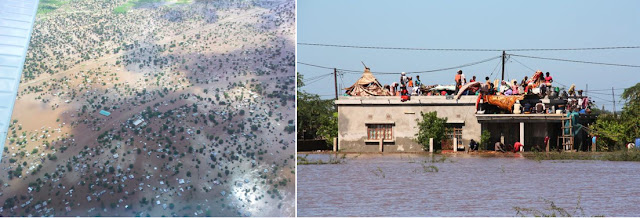But the mail here does come with some challenges. Boxes are frequently opened and things do go missing. Some letters arrive in 10 days, while others take two months. There doesn't seem to be any rhyme or reason to the order in which they get here - not size, not place of origin - they just show up when they do. I have advised people who plan to send things that they shouldn't declare anything of any value, as this will make the package much more interesting to people in the post office here, but the definition of valuable is different in Mozambique. My dad had sent some episodes of the one TV show I am sad to be missing on a flash drive and had declared the drive on the package. I mentioned that that might not make it, since flash drives have been taken from packages before. But the I idea of a luxury item like recent episodes of a Showtime show not making it was hard to get upset over. I am very grateful to him for sending it, but the world will move on if it doesn't arrive. And I still get the warm fuzzies of knowing that he tried.
 |
| Evidence that Peace Corps life is good. |
Basically, I have everything I need here and people send me the stuff I want; i.e. life is good. So I get a little surprised when people comment that I am taking the little difficulties well. There are definitely things here that make life more complicated than in the US, but I expected that when coming here. I have found that by managing my expectations, most things are pretty easy to take in stride. (That, and doing yoga every day works miracles for patience!)
 |
| Life was good at the fish market in Maputo this weekend. |
This point has been driven home painfully over the last week as the southern part of the country has been devastated by flooding. Rains hit the central region right around my birthday in early January and lots of roads in my area were impassable for a few days. Other than a papaya tree that fell in my backyard, I came through unaffected. My friends a few hours south live in a more traditional Mozambican house; they have an outdoor kitchen area and pit latrine outside, both of which took some serious damage due to the rains. And I am sure that many people living in mud-brick homes with grass or corrugated metal roofs had a much rougher time, too. But the situation in the South right now is a true disaster.
 |
| Scenes from Chockwé, Gaza Province. From USAID Mozambique and TimesLive |
Most of the volunteers who had been evacuated from their sites in Gaza and Inhambane, the province just north, were understandably upset that their houses had been flooded and they probably lost many of their belongings. Some were worried that they wouldn't be able to return to their communities and would be moved to a new site. But they were all acutely aware of how lucky they were to have been evacuated by the Peace Corps and got a somewhat haunted look when they started talking about the damage that had been done to their towns and what their neighbors, friends and colleagues would be facing to rebuild. As Peace Corps Volunteers, we have resources at our disposal that just aren't available to those we live and work with every day.
Disasters really highlight this difference, but it is always there. I can get frustrated with the fact that I am preparing to teach a course I have never taught before and live in a city without a real bookstore within a day's travel. I can get irritated when my flight is delayed indefinitely and the people at the gate don't know if the plane we will be taking has left its point of departure yet. I do shake my fist every time it is supposed to be trash day and despite the fact that I pay the city to pickup my garbage, they have left it and the neighborhood dogs have scattered it all over the sidewalk. But the truth is, if it is really so bad, I can leave. But the people living next to me will be facing the same reality while I am back in a country where ATM's usually have cash in them and most things follow some semblance of a schedule. Where physician density is above .027/1,000 people and HIV prevalence is below 11.5%. Where less than 21% of children under 5 are underweight and more than 56% of the population is literate. But I came here because Mozambique faces these problems and I want to do what I can to help. And for me, the good in life here significantly outweighs the bad.
No comments:
Post a Comment